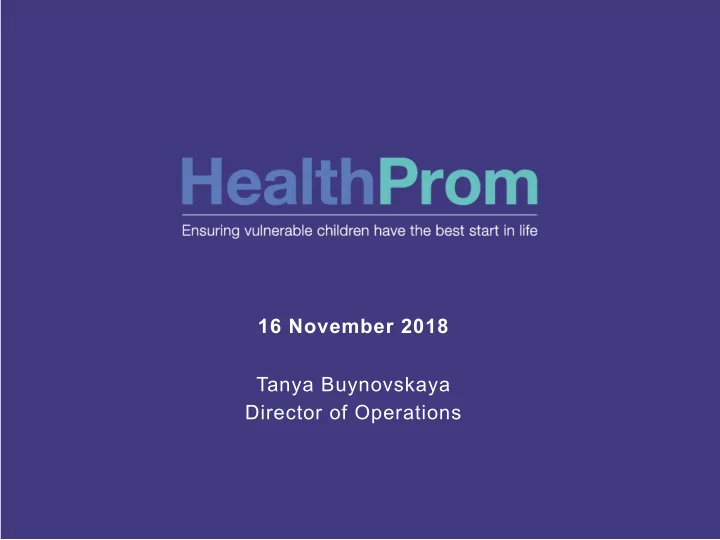

16 November 2018 Tanya Buynovskaya Director of Operations
About Us Established in 1984, we work to ensure vulnerable children have the best start in life. Our work addresses 3 key challenges : 1. Poor maternal and child health; 2. High levels of institutionalisation of young children; 3. Social exclusion of children with disabilities.
As set out in our Theory of Change our key focus areas are:
Where we work Belarus Tajikistan Afghanistan Russia Moldova Ukraine Kyrgyzstan
Our Projects • Reducing maternal and neonatal mortality in rural Afghanistan. • Protecting the rights of children with severe disabilities and life- limiting conditions in Belarus . • Putting Families First: safe, sustainable families in urban and rural communities in Tajikistan . • Improving access to pre-school support services for vulnerable children with special needs in Moldova.
Our Projects • Siberian Initiative for Inclusion – building local partnerships to support the inclusion of children with disabilities in Russia. • Supporting the development of social services for vulnerable children and their families in Tajikistan. • Supporting the national agenda on Early Intervention in Ukraine and strengthening parent-led advocacy for children with disabilities .
Our work in Russia Siberian Initiative for Inclusion – building local partnerships for inclusion of children with disabilities in Russia. Locations: 4 regions of Siberia– Krasnoyarsk, Tomsk, Novosibirsk and Altai Local partner: Krasnoyarsk Centre for Community Partnerships The overall objective is to promote the inclusion of children with disabilities into education through developing and strengthening partnerships between local civil society organisations, parents and local government across the four pilot regions. The project will focus on improving the situation of the final beneficiaries, which include 1,200 children with disabilities and 1,200 parents. Supported by British & Foreign School Society
A bit of background In 2014 we started a small project “Inclusion for all – opening school doors for children with disabilities in Russia” -Two practical training programmes for teachers, specialists of social support centers, parents and NGOs in Krasnoyarsk. Trained 78 teachers from 21 schools, 37 social work and child disability specialists. Also trained 98 parents of CWDs and worked with 6 pilot schools in Krasnoyarsk. -Created on-line library of materials and publications on inclusive education with more than 3,000 downloads. -Provided support to parents-led NGOs –”Open Hearts” -Organized inclusive public events with more than 128 CWD participating in them Supported by British & Foreign School Society
Recent changes • Russia ratified the UN Convention on the Rights of Persons with Disabilities in 2012. • In 2017 the federal law prohibiting discrimination on the grounds of disability in employment was adopted, a fund to support children with disabilities was in place, and persons with disabilities were being assisted in finding work. This was achieved through the federal ‘Accessible Environment’ programme with a budget of $7.5 billion over ten years. The United Nations Human Rights Office of the High • Commissioner (OHCHR) in February 2018 reviewed Russia’s implementation of this Convention on the Rights of Persons with Disabilities and highlighted some positive changes and key areas for improvement.
Positive changes Explicit prohibition of discrimination based on disability in legislation (2017) • The adoption of the State Accessible Environment Programme for 2011– 2020 (now • extended to 2025) The increase in the number of students with disabilities in inclusive education • Russian sign language universally recognized in the country and there significant • increase of television programs with subtitles. Areas of concern Russia continues to rely on medical care and rehabilitation and there is still a focus on • creating specialized services, which may lead to segregation. Large numbers of boys and girls with disabilities living in institutions • Segregated education is still in practice, despite the increase in the number of children • with disabilities in mainstream education, in line with the concept of inclusive education. Lack of transparent financial resources allocated and mechanisms established to • ensure equal conditions and support for all persons with all types of impairment in general education, as guaranteed by federal legislation. Regional disparities due to the varied conditions and availability of financial resources • in different regions.
Siberian Initiative for Inclusion What we have done so far -established inclusive education training programmes and networks in Krasnoyarsk, Altai and Novosibirsk region -trained more than 370 specialists in 3 regions of Siberia – 178 school teachers and 198 social workers and child disability specialists -worked with more than 115 parents of CWDs from 50 parents-led and child disability NGOs -established Siberian Network on Inclusion with a group on Facebook (148 members) -Krasnoyarsk partners are now recognised as a leading NGO on inclusion in Siberia
Siberian Initiative for Inclusion
Siberian Initiative for Inclusion
THANK YOU tanya@healthprom www.healthprom.org facebook.com/HealthProm · twitter: @healthprom Registered charity number: 1100459
Recommend
More recommend